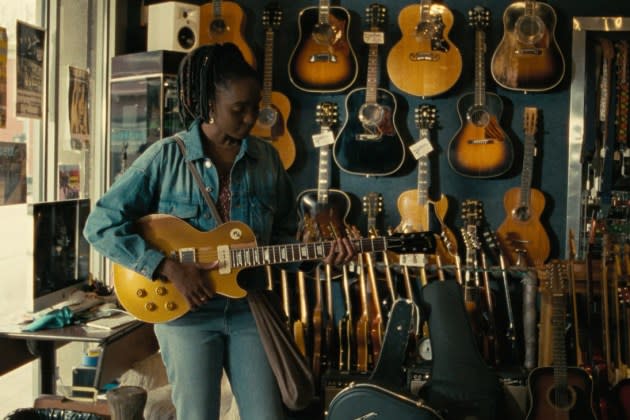‘Dandelion’ Review: KiKi Layne Strikes Resounding Chords in a Well-Observed Drama That’s Strongest When It Sings

In the multitude of A Star Is Born movies and their progeny, an aspiring artist’s struggles are prelude to a melodrama of triumph and conflict, played out in the unforgiving glare of the fame machine’s klieg lights. Nicole Riegel’s Dandelion turns that template inside out: In its fringe milieu of shadows, the yearning and bursts of inspiration, the discouragement and relentless hard work are not prelude but the main action.
The story of a young singer-songwriter who’s stuck in a nowhere loop until she takes an impulsive leap, the feature is sometimes clunky but often quietly transporting, with strong chemistry between KiKi Layne as the title character and Thomas Doherty as the charismatic musician she meets when she ventures out of Cincinnati and her self-defeating rut.
More from The Hollywood Reporter
This is the second part of a planned trilogy centering on Ohio women, and, as in her debut feature, Holler, Riegel has a sure feel for the working-class Midwestern setting. But as with that film, her dialogue tends to undercut the aimed-for cinematic impact, articulating themes with a clanging insistence.
Dandelion is at its strongest when the helmer lets the movie’s visual language and its music cast their spell. Whether in soul-searching close-ups, nighttime views of the Ohio River or vistas of the South Dakota badlands, the dynamic camerawork of Lauren Guiteras speaks volumes. And the songs that the two main characters create and perform onscreen, written by The National’s Bryce and Aaron Dessner (whose scores also elevated movies like Jockey and C’mon C’mon) with contributions from Riegel and Layne, give stretches of the drama an indie-operatic zing, the music conveying everything we need to know.
Layne (If Beale Street Could Talk) brings an arresting combination of youthful volatility and old-soul watchfulness to her performance, communicating defeat, ecstasy, and every half-note in between. The first glimpse of her character, whose given name is Theresa and for whom Dandelion is more than a stage name, captures the serious joy that propels the story: She’s stringing and tuning her guitar. That communion between musician and instrument, songwriter and song, is at the movie’s core.
When Dandelion sells her beloved Gibson Les Paul Gold Top electric to help pay for medical treatments for her ailing mother (Melanie Nicholls-King), the moment is all the more excruciating for the understated, matter-of-fact way it unfolds.
Dandelion is driven to make music, but the thrill is gone. Her three-night-a-week gig in a drab hotel lounge barely pays, and the inattentive drinkers have made her despondent and bitter, even as she dreams of finding the right crowd for her introspective songs. When a friend suggests that she enter a music showcase and competition at a famous motorcycle rally, she scoffs at the idea, certain that its crowd is not the one she’s searching for. But after an overcooked exposition drop disguised as a fight with her mother, she hits the road for Sturgis, South Dakota.
In her first few hours there, a busted guitar string, cruel heckling and a dead car battery spell doom. But hope and help arrive in the form of Casey (Doherty), a musician with an inviting smile and a Scottish lilt to his voice. Rejoining the band he once was a part of (the real-life group Brother Elsey, led by brothers Brady and Jack Stablein, playing versions of themselves), he’s embraced warily, the bad blood still simmering.
Doherty, who starred on the recent Gossip Girl reboot and serves as a brand ambassador for Dior, not only scruffs up nicely, but also brings a compelling element of hooded pain to the role of Casey, whose phone buzzes at inopportune times and who tosses around vague references to a job “in sales” and an estranged wife, his gaze hungry, sorrowful and, to the audience, if not the enraptured Dandelion, ominous.
“I’m just a guy who used to be in a band,” Casey tells Dandelion, but clearly he’s stoked to be drawn into her creative process. Their motorcycle rides through the striking landscape lead to songwriting sessions — one, memorably, atop a windy overlook — and lovemaking in the thick of nature.
Sorting out lyrics, melody and harmony, they’re also figuring out who they are to each other, their fast-tracked intimacy not merely physical. Their voices and guitars are in exhilarating sync, but Dandelion, sensing something amiss, pours qualms into her songs. Brainstorming sessions turn into emotional duels, and public performances into standoffs, charged with uncertainty and Dandelion’s fighting spirit. Her creative integrity is Riegel’s core concern.
Stumbling when it stops to deliver stilted conversations on ambition versus creativity or verbal freak-outs that are as neat and tidy as pointedly poetic exchanges, Dandelion finds its groove, fittingly, through song. Beyond the contrivances and unwieldy pieces in Riegel’s screenplay, a sensibility that’s coherent and urgent builds.
When the director trusts what’s onscreen enough to let it speak for itself, Dandelion is alive with a persuasive friction. It’s in the clutter of the protagonist’s Cincinnati home and, to a lesser extent, Casey’s RV, all of it terrific work by production designer Maren H. Jensen that taps into a potent feeling of life captured midsentence.
In Layne’s sensitive characterization, there’s nothing self-congratulatory about the way Dandelion embraces her vulnerability and desire. A climactic sequence, edited with impressive vitality by Milena Z. Petrovic, finds the songwriter turning flash points of memory — the gifts and the treachery alike — into fuel for her art. Stardom might or might not be the payoff for Dandelion, but to see her reunited with her electric guitar, or one just like it, is to witness the unfurling of something hard-won, a kind of musical gold that’s nothing short of exhilarating.
Best of The Hollywood Reporter

 Yahoo News
Yahoo News 